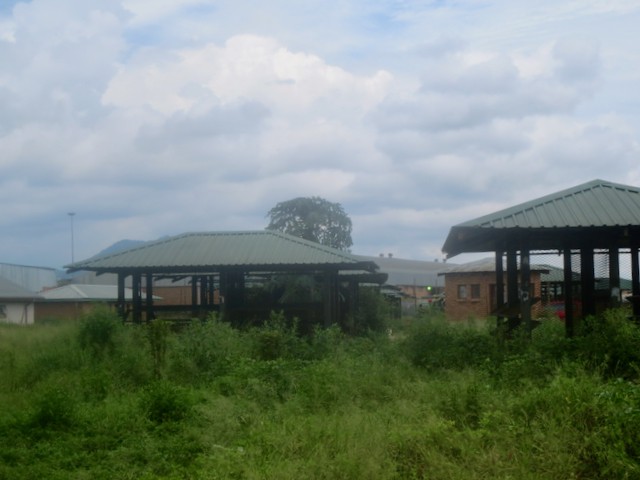Market stalls built by municipality left to rot for years
Giyani hawkers want to know why stalls were never allocated
Market stalls built years ago in central Giyani in Mopani District, Limpopo, were never allocated to hawkers. Photo: Bernard Chiguvare
- Market stalls built in central Giyani in Mopani District, Limpopo, years ago were never allocated to hawkers.
- They are now overgrown and people say the place is a hangout for criminals.
- The municipality says it is busy registering hawkers and will allocate the stalls.
Residents are asking why market stalls built in central Giyani in Mopani District, Limpopo, more than seven years ago were never allocated to hawkers.
Situated behind the Shoprite supermarket, the stalls were meant for the town’s hawkers. They are now overgrown with bushes. According to the hawkers this has become a place for criminal activities.
GroundUp saw several men hanging around the stalls and was warned by locals not to go near them and that muggings take place in that area.
Thembani Chauke, a community leader, says they would like to know why the municipality never allocated the stalls.
But Giyani municipality spokesperson Steven Mavunda said, “Due to its location, the market stalls are unattractive to the hawkers who prefer to trade at overcrowded places like the Giyani CBD taxi rank.”
“Ideally, the municipality wants to reduce overcrowding and promote cleanliness around town by confining hawkers to a controlled trading environment,” he said.
However, hawkers say they do want to use the stalls. Jackson Mdaka has three makeshift stalls around town, selling vegetables, cosmetics and food. “I have been a hawker for more than ten years. When it rains there is no business … I would have loved to be at the constructed market stalls, but I wonder why the municipality is not allocating anyone these market stalls,” he said.
Mdaka said it would be better for him to have his three stalls under one roof. “As it is, I have to walk up and down several times to monitor what is going on at different stalls,” he said.
Another hawker, who did not wish to have her name published, said she was very happy when she saw the stalls being built and thought she would be allocated one.
Spokesperson Mavunda said Mayor Shibambu Basani had rolled out a programme identifying and registering all hawkers in the CBD in order to allocate the stalls, but progress had been hampered by lockdown. The process is now underway again, Mavunda said.
Mavunda said the municipality is not aware of any criminal activities taking place in that area.
GroundUp obtained the tender document number for the construction of the stalls and found that it was to close in October 2011, but could get no further information as to the cost and exact date of completed construction.
Support independent journalism
Donate using Payfast

Next: Patients turned away as clinics close over health worker protests
Previous: Covid-19: Don’t put other people’s lives at risk, urges hospital cleaner
© 2021 GroundUp. This article is licensed under a Creative Commons Attribution-NoDerivatives 4.0 International License.
You may republish this article, so long as you credit the authors and GroundUp, and do not change the text. Please include a link back to the original article.
We put an invisible pixel in the article so that we can count traffic to republishers. All analytics tools are solely on our servers. We do not give our logs to any third party. Logs are deleted after two weeks. We do not use any IP address identifying information except to count regional traffic. We are solely interested in counting hits, not tracking users. If you republish, please do not delete the invisible pixel.

